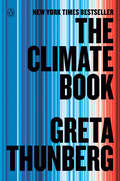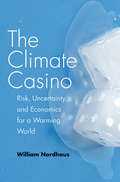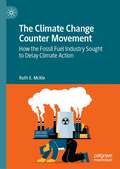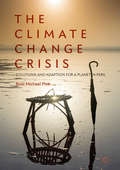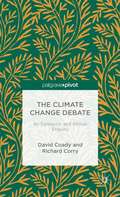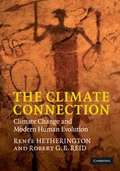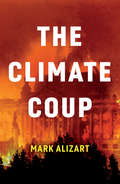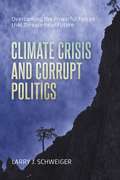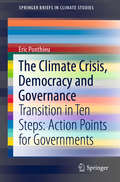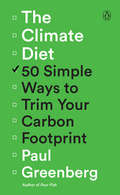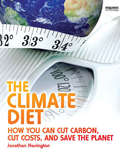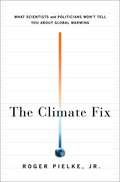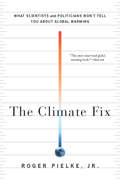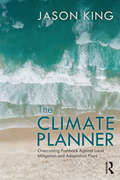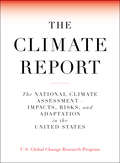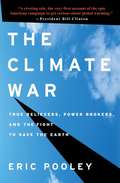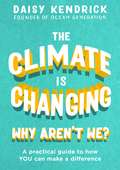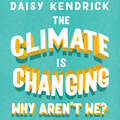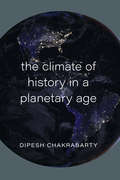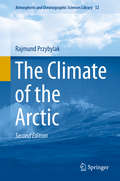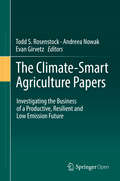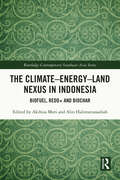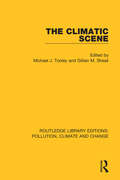- Table View
- List View
The Climate Book: The Facts and the Solutions
by Greta ThunbergA NEW YORK TIMES BESTSELLERWe still have time to change the world. From climate activist Greta Thunberg, comes the essential handbook for making it happen.You might think it's an impossible task: secure a safe future for life on Earth, at a scale and speed never seen, against all the odds. There is hope—but only if we listen to the science before it's too late.In The Climate Book, Greta Thunberg has gathered the wisdom of over one hundred experts—geophysicists, oceanographers and meteorologists; engineers, economists and mathematicians; historians, philosophers and Indigenous leaders—to equip us all with the knowledge we need to combat climate disaster. Throughout, illuminating and often shocking grayscale charts, graphs, diagrams, photographs, and illustrations underscore their research and their arguments. Alongside them, she shares her own stories of demonstrating and uncovering greenwashing around the world, revealing how much we have been kept in the dark. This is one of our biggest challenges, she shows, but also our greatest source of hope. Once we are given the full picture, how can we not act? And if a schoolchild's strike could ignite a global protest, what could we do collectively if we tried?We are alive at the most decisive time in the history of humanity. Together, we can do the seemingly impossible. But it has to be us, and it has to be now.
The Climate Casino
by William D. NordhausClimate change is profoundly altering our world in ways that pose major risks to human societies and natural systems. We have entered the Climate Casino and are rolling the global-warming dice, warns economist William Nordhaus. But there is still time to turn around and walk back out of the casino, and in this essential book the author explains how. Bringing together all the important issues surrounding the climate debate, Nordhaus describes the science, economics, and politics involved--and the steps necessary to reduce the perils of global warming. Using language accessible to any concerned citizen and taking care to present different points of view fairly, he discusses the problem from start to finish: from the beginning, where warming originates in our personal energy use, to the end, where societies employ regulations or taxes or subsidies to slow the emissions of gases responsible for climate change. Nordhaus offers a new analysis of why earlier policies, such as the Kyoto Protocol, failed to slow carbon dioxide emissions, how new approaches can succeed, and which policy tools will most effectively reduce emissions. In short, he clarifies a defining problem of our times and lays out the next critical steps for slowing the trajectory of global warming.
The Climate Change Counter Movement: How the Fossil Fuel Industry Sought to Delay Climate Action
by Ruth E. McKieThis book provides an historical account of the emergence and spread of the climate change counter movement across the globe. Drawing on an extensive database developed by the author, the book recounts the development of an international network, taking the reader on a journey through the history of the movement before looking closely at a series of comparative case studies examining movement organisations in different countries.
The Climate Change Crisis: Solutions And Adaption For A Planet In Peril
by Ross Michael PinkThis book explores how the world community will respond to the unfolding humanitarian crisis caused by climate change. It recognises climate change as the greatest threat to human development in the 21st century, bringing with it: flooding, drought, extreme temperatures, health crises, threats to human security and severe harm to economic development.The Climate Change Crisis addresses climate change and its impact as a major threat for countries around the world. Through a collection of interviews with leading environmentalists and exploration into new innovations that can offer hope and protection for billions of people, this book presents an interdisciplinary approach towards understanding the paramount health and development challenges of climate change.This timely and informative book cuts across several disciplines, including human rights, public policy, international relations, national refugee policy, and migration studies.
The Climate Change Debate: An Epistemic and Ethical Enquiry
by David Coady Richard CorryOf the two kinds of philosophical questions - epistemic and ethical - raised by the public debate about climate change, professional philosophers have dealt almost exclusively with the ethical. This book is the first to address both and examine the relationship between them.
The Climate Connection: Climate Change and Modern Human Evolution
by Renée Hetherington Robert G. B. ReidAnalysis of climate change and human evolution, migration and behavioural change and implications for our future.
The Climate Coup
by Mark AlizartInaction by governments in the face of climate change is often attributed to a lack of political will or a denial of the seriousness of the situation, but as Mark Alizart argues in this provocative book, we shouldn’t exclude the possibility that part of the reluctance might be motivated by cynicism and even sheer evil: for some people, there are real financial and political benefits to be gained from the chaos that will ensue from environmental disaster. The climate crisis creates its winners – individuals who orchestrate environmental chaos and bet on the collapse of the world as they bet on declining share values. In the face of this veritable ‘carbofascist’ coup targeting humanity, modifying our behaviour as individuals won’t suffice. We must train our critical attention on those financial and political actors who speculate on catastrophe and, in the light of this, we must rethink the strategy of ecological activism. This is a war to win, not a crisis to overcome.
The Climate Crisis
by David Archer Stefan RahmstorfMost climate scientists wholeheartedly agree with the above statement by the US President. An incredible wealth of scientific data on global warming has been collected in the last few decades. The history of the Earth's climate has been probed by drilling into the polar ice sheets and the sediment layers of the oceans' vast depths. Great advances have been made in computer modeling of our climate. Each year, over 10,000 scientific papers are published containing the key word "climate".
The Climate Crisis and Corrupt Politics: Overcoming the Powerful Forces that Threaten our Future
by Larry J SchweigerThere is only one earth and our world is undergoing dramatic changes brought on by the climate crisis and other human-induced ecological disruptions. The world's top scientists studying these threats and the forces behind them have been warning us for dec
The Climate Crisis, Democracy and Governance: Transition in Ten Steps: Action Points for Governments (SpringerBriefs in Climate Studies)
by Eric PonthieuThis book argues that at a time when the world is facing environmental and social upheaval, the political establishment has been unwilling to listen and slow to act. This is reflected in a political system that has been incapable of rising to the challenge. Only by governments taking a radical and progressive lead in making changes – imposing them if necessary – can there be any hope of slowing, stopping and then reversing our global catastrophe. Governments hold the prime responsibility in the creation of a virtuous circle of positive action for the climate. Starting from a European perspective, a ten point manifesto explains how this can be done and how we can have hope for the future. The book is a call for action to European governments in the approach to COP26 and when plans for a European Green Deal are being discussed in the EU.Disclaimer: The author of this publication is acting in his own name. The viewpoints he defends are in no way reflecting the opinion of the European Economic and Social Committee and of other EU institutions.
The Climate Diet: 50 Simple Ways to Trim Your Carbon Footprint
by Paul GreenbergA celebrated writer on food and sustainability offers fifty straightforward, impactful rules for climate-friendly living"Some strong and rational suggestions for reducing your personal impact here--and when you're eating smart, you'll have the energy to do the movement building we need to change systems too! This book integrates the individual and the societal in a powerful way."--Bill McKibbenWe all understand just how dire the circumstances facing our planet are and that we all need to do our part to stem the tide of climate change. When we look in the mirror, we can admit that we desperately need to go on a climate diet. But the task of cutting down our carbon emissions feels overwhelming and the discipline required hard to summon. With The Climate Diet, award-winning food and environmental writer Paul Greenberg offers us the practical, accessible guide we all need. It contains fifty achievable steps we can take to live our daily lives in a way that's friendlier to the planet--from what we eat, how we live at home, how we travel, and how we lobby businesses and elected officials to do the right thing. Chock-full of simple yet revelatory guidance, The Climate Diet empowers us to cast aside feelings of helplessness and start making positive changes for the good of our planet.
The Climate Diet: How You Can Cut Carbon, Cut Costs, and Save the Planet
by Jonathan HarringtonThe atmosphere is getting fat on our carbon and other greenhouse gas emissions and it needs our help. We live in a world of excess, consuming too much of everything-food, clothes, cars, toys, shoes, bricks, and mortar. Our bingeing is often so extreme that it threatens our own health and wellbeing. And we are not the only ones who are getting sick. The Earth, which provides the food, air, water, and land that sustains us, is also under severe pressure. We either take steps to put our personal and planetary systems back into balance or we suffer the consequences. So, what does any unhealthy overweight person do when the doctor tells him or her that they are eating themselves into an early grave? Go on a diet! This is the must-have guide to the most important diet ever, explaining climate change concepts, problems, and solutions in ways that anyone can easily understand. Following a six-step climate diet plan, families will be able to count their carbon calories and learn how to reduce them, leaving us with a slim healthy planet now and for the future.
The Climate Fix: What Scientists and Politicians Won't Tell You About Global Warming
by Roger A. Pielke Jr.In The Climate Fix, Roger Pielke, Jr., a political scientist and a world-renowned expert on he intersection of politics and science, dissects the climate debate and diagnoses what has gone wrong and who's to blame for the mess. His answers will surprise you--it is the people who are best positioned to see clearly why we need to respond to climate change who are, more often than not, the people who get in the way of anything being accomplished. How is that possible? Quite simply, it's because most supporters of action on climate change, whether scientists, politicians, or activists, have gotten caught up in a vicious cycle. It begins with the belief that there is insufficient political will for action. Fixing this, it is assumed, requires that everyone agree on all aspects of climate change--both the dangers and the remedies. Accomplishing that means scaring people in the hope that fear will accomplish what reason has not. Fear often requires politicizing science, shaping its presentation in an effort to motivate a specific political outcome. But rather than making action more likely the posturing reinforces a state of inaction. Thus the cycle continues, and its malign influence can be felt in all quarters, from the halls of government and academia to the newspaper and your favorite dog. Pielke lays these problems bare for all to see. But he does more than just wag his finger. The Climate Fix presents first steps on a better path, one that returns to what really matters in the climate debate: expanding energy access (including for the 1.3 billion people worldwide who have none) and increasing energy security while lowering costs through technological innovation. Without those goals, Pielke argues, well never wean ourselves off carbon-heavy energy, whatever the hard-core environmentalists say. With them, we can not only help save our own lives but also improve everyone's, and turn a vicious cycle into a virtuous one. It is time to do something about climate change. We can keep trying to do it the old way, or we can try something new, something offensive to neither our livelihoods nor our common sense. The choice, even after years of muddy debate, should be clear. Which will you choose?
The Climate Fix: What Scientists and Politicians Won't Tell You About Global Warming
by Roger Pielke Jr.Why has the world been unable to address global warming? Science policy expert Roger Pielke, Jr., says it's not the fault of those who reject the Kyoto Protocol, but those who support it, and the magical thinking that the agreement represents. In The Climate Fix, Pielke offers a way to repair climate policy, shifting the debate away from meaningless targets and toward a revolution in how the world's economy is powered, while de-fanging the venomous politics surrounding the crisis. The debate on global warming has lost none of its power to polarize and provoke in a haze of partisan vitriol. The Climate Fix will bring something new to the discussions: a commonsense perspective and practical actions better than any offered so far.
The Climate Planner: Overcoming Pushback Against Local Mitigation and Adaptation Plans
by Jason KingThe Climate Planner is about overcoming the objections to climate change mitigation and adaption that urban planners face at a local level. It shows how to draft climate plans that encounter less resistance because they involve the public, stakeholders, and decisionmakers in a way that builds trust, creates consensus, and leads to implementation. Although focused on the local level, this book discusses climate basics such as carbon dioxide levels in the atmosphere, the Intergovernmental Panel on Climate Change, the Paris Agreement of 2015, worldwide energy generation forecasts, and other items of global concern in order to familiarize urban planners and citizen planners with key concepts that they will need to know in order to be able to host climate conversations at the local level. The many case studies from around the United States of America show how communities have encountered pushback and bridged the implementation gap, the gap between plan and reality, thanks to a commitment to substantive public engagement. The book is written for urban planners, local activists, journalists, elected or appointed representatives, and the average citizen worried about climate breakdown and interested in working to reshape the built environment.
The Climate Report: National Climate Assessment-Impacts, Risks, and Adaptation in the United States
by U.S. Global Change Research ProgramTo hide its dramatic findings, the government released its mandated Climate Assessment Report on Black Friday while everyone was out shopping. Melville House is rushing the report into print - including all its charts, graphs, and illustrations - to broadcast its meticulous and devastating findings about the causes and impact of global warming.The U.S. Global Change Research Program (USGCRP) is mandated by law "at least every four years ... to submit to the President and the Congress an assessment regarding the findings of ... the effects of global change, and current and major long-term trends in global change." This year, the report was released in the wake of a series of some of the most devastating hurricanes in American history, as well as the horrific California wildfires. As the report says, "The assumption that current and future climate conditions will resemble the recent past is no longer valid."Detailing not only the devastating impact of global warming on the environment, but health issues leading to tens of thousands of deaths per year, and economic losses of tens of billions of dollars, the report concludes that "The evidence of human-caused climate change is overwhelming and continues to strengthen, that the impacts of climate change are intensifying across the country, and that climate-related threats ... are rising."
The Climate War: True Believers, Power Brokers, and the Fight to Save the Earth
by Eric PooleyIn The Climate War, Eric Pooley--deputy editor of Bloomberg BusinessWeek--does for global warming what Bob Woodward did for presidents and Lawrence Wright did for terrorists. In this epic tale of an American civil war, Pooley takes us behind the scenes and into the hearts and minds of the most important players in the struggle to cap global warming pollution--a fight in which trillions of dollars and the fate of the planet are at stake. Why has it been so hard for America to come to grips with climate change? Why do so many people believe it isn't really happening? As President Obama's science advisor John Holdren has said, "We're driving in a car with bad brakes in a fog and heading for a cliff. We know for sure that cliff is out there. We just don't know exactly where it is. Prudence would suggest that we should start putting on the brakes." But powerful interests are threatened by the carbon cap that would speed the transition to a clean energy economy, and their agents have worked successfully to deny the problem and delay the solutions. To write this book, Pooley, the former managing editor of Fortune and chief political correspondent for Time, spent three years embedded with an extraordinary cast of characters: from the flamboyant head of one of the nation's largest coal-burning energy companies to the driven environmental leader who made common cause with him, from leading scientists warning of impending catastrophe to professional skeptics disputing almost every aspect of climate science, from radical activists chaining themselves to bulldozers to powerful lobbyists, media gurus, and advisors in Obama's West Wing--and, to top it off, unprecedented access to former Vice President Al Gore and his team of climate activists. Pooley captures the quiet determination and even heroism of climate campaigners who have dedicated their lives to an uphill battle that's still raging today. He asks whether we have what it takes to preserve our planet's habitability, and shows how America's climate war sends shock waves from Bali to Copenhagen. No other reporter enjoys such access to this cast of characters. No other book covers this terrain. From the trenches of a North Carolina power plant to the battlefields of Capitol Hill, Madison Avenue, and Wall Street, The Climate War is the essential read for anyone who wants to understand the players and politics behind the most important issue we face today.
The Climate is Changing, Why Aren't We?: A practical guide to how you can make a difference
by Daisy Kendrick'An inspirational and motivational must-read, packed with practical tips to push for positive change' Zanna van DijkThe climate is changing, so why aren't we? After all, we are the generation of change. The severity of climate change leaves no one indifferent. The Climate is Changing, Why Aren't We? will not try to convince you that climate change exists - we know that. It offers easy to understand insights into the structures that suffocate our future, while upholding a sense of optimism and humanising the climate story. From the clothes you buy, plastics you use and food you eat, to knowing how to harness the power of social media and technology to get our voices heard and demand climate action, Daisy Kendrick, founder of Ocean Generation, weaves together inspirational stories, shocking statistics and easy green switches to make in your everyday life to tackle climate change on an individual level. The Climate is Changing, Why Aren't We? will help to grant future generations the rights they deserve.
The Climate is Changing, Why Aren't We?: A practical guide to how you can make a difference
by Daisy Kendrick'An inspirational and motivational must-read, packed with practical tips to push for positive change' Zanna van DijkThe climate is changing, so why aren't we? After all, we are the generation of change. The severity of climate change leaves no one indifferent. The Climate is Changing, Why Aren't We? will not try to convince you that climate change exists - we know that. It offers easy to understand insights into the structures that suffocate our future, while upholding a sense of optimism and humanising the climate story. From the clothes you buy, plastics you use and food you eat, to knowing how to harness the power of social media and technology to get our voices heard and demand climate action, Daisy Kendrick, founder of Ocean Generation, weaves together inspirational stories, shocking statistics and easy green switches to make in your everyday life to tackle climate change on an individual level.The Climate is Changing, Why Aren't We? will help to grant future generations the rights they deserve.
The Climate is Changing, Why Aren't We?: A practical guide to how you can make a difference
by Daisy Kendrick'An inspirational and motivational must-read, packed with practical tips to push for positive change' Zanna van DijkThe climate is changing, so why aren't we? After all, we are the generation of change. The severity of climate change leaves no one indifferent. The Climate is Changing, Why Aren't We? will not try to convince you that climate change exists - we know that. It offers easy to understand insights into the structures that suffocate our future, while upholding a sense of optimism and humanising the climate story. From the clothes you buy, plastics you use and food you eat, to knowing how to harness the power of social media and technology to get our voices heard and demand climate action, Daisy Kendrick, founder of Ocean Generation, weaves together inspirational stories, shocking statistics and easy green switches to make in your everyday life to tackle climate change on an individual level. The Climate is Changing, Why Aren't We? will help to grant future generations the rights they deserve.
The Climate of History in a Planetary Age
by Dipesh ChakrabartyFor the past decade, historian Dipesh Chakrabarty has been one of the most influential scholars addressing the meaning of climate change. Climate change, he argues, upends long-standing ideas of history, modernity, and globalization. The burden of The Climate of History in a Planetary Age is to grapple with what this means and to confront humanities scholars with ideas they have been reluctant to reconsider—from the changed nature of human agency to a new acceptance of universals. Chakrabarty argues that we must see ourselves from two perspectives at once: the planetary and the global. This distinction is central to Chakrabarty’s work—the globe is a human-centric construction, while a planetary perspective intentionally decenters the human. Featuring wide-ranging excursions into historical and philosophical literatures, The Climate of History in a Planetary Age boldly considers how to frame the human condition in troubled times. As we open ourselves to the implications of the Anthropocene, few writers are as likely as Chakrabarty to shape our understanding of the best way forward.
The Climate of the Arctic
by Rajmund PrzybylakThis book is a new and revised second edition of the book 'The Climate of the Arctic', published in 2003. It presents a comprehensive analysis of the current state of knowledge related to the climate of the Arctic, using the latest meteorological data. All meteorological elements are described in detail and an up-to-date review of the available literature for each element is given. Climatic regions are distinguished and described. The monograph also provides an account of the present state of research on climate change and variability in the Arctic for three time scales: the Holocene, the last Millennium, and the instrumental period. The book concludes with a presentation of the scenarios of the Arctic climate in the 21st century. This monograph is intended for all those with a general interest in the fields of meteorology, climatology, and with a knowledge of the application of statistics in these areas.
The Climate-Smart Agriculture Papers: Investigating the Business of a Productive, Resilient and Low Emission Future
by Todd S. Rosenstock Andreea Nowak Evan GirvetzThis book is open access under a CC BY 4.0 license.This volume shares new data relating to Climate-Smart Agriculture (CSA), with emphasis on experiences in Eastern and Southern Africa. The book is a collection of research by authors from over 30 institutions, spanning the public and private sectors, with specific knowledge on agricultural development in the region discussed. The material is assembled to answer key questions on the following five topic areas: (1) Climate impacts: What are the most significant current and near future climate risks undermining smallholder livelihoods? (2) Varieties: How can climate-smart varieties be delivered quickly and cost-effectively to smallholders? (3) Farm management: What are key lessons on the contributions from soil and water management to climate risk reduction and how should interventions be prioritized? (4) Value chains: How can climate risks to supply and value chains be reduced? and (5) Scaling up: How can most promising climate risks reduction strategies be quickly scaled up and what are critical success factors? Readers who will be interested in this book include students, policy makers, and researchers studying climate change impacts on agriculture and agricultural sustainability.
The Climate–Energy–Land Nexus in Indonesia: Biofuel, REDD+ and biochar (Routledge Contemporary Southeast Asia Series)
by Akihisa Mori Alin HalimatussadiahThis book extends the framework of the climate-energy-land nexus to elucidate political, economic, social, and institutional factors and causal mechanisms that stringent climate targets bring about, rather than mitigate a disproportional heavy burden on the forest sector in Indonesia. Assessing climate, energy, agricultural, forest, and transmigration policies, and REDD+ and biochar solutions through a multidisciplinary approach, ranging from biological, agricultural, technological, economic, and institutional lenses, the book identifies the political-economic and socio-technical regimes that cause the crosssectoral transfer of responsibility for greenhouse gas emissions to palm-oil-based biofuel, imposing an excess burden on the forest sector and accelerating indirect land-use change. It also proposes possible countermeasures for agricultural and forest sectors, reconfirming that technical applications and integrated policymaking should trigger the socioeconomic changes that will make transformative change happen in Indonesia. As an analysis of the success, or otherwise, of stringent climate targets, policies, and technological and non-technological measures on the reduction of greenhouse gases, this book will be of great interest to students and scholars in the fields of environment & sustainability, Asian studies, energy, environment and agriculture, forestry, and agriculture & environmental sciences. It will also appeal to practitioners and policymakers tackling net-zero emissions and land and forest governance.
The Climatic Scene
by Michael J. Tooley Gillian M. SheailOriginally published in 1985, this volume of essays was compiled in honour of Gordon Manley, a major and distinctive twentieth-century figure in climatology. The range and scope of the topics covered reflect the eclectic interests of Manley, whose orientation was always towards the importance of climate and its impact on mankind. The state of the art of climatic change is considered at different scales by the contributors: from instrumental records on a local scale from Durham and Manchester to discussions on the regional and continental scale. Methodological problems relating to climatic change are treated. The effects of climate and climatic change on plant distribution, disease vectors and agricultural pests are also considered.
